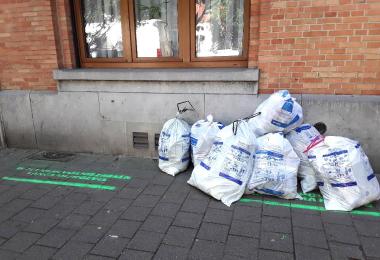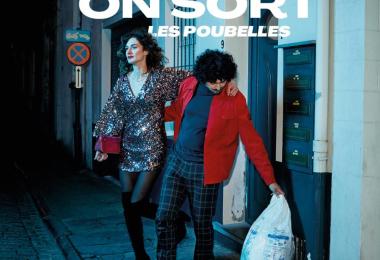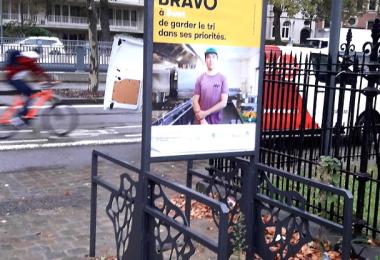6
Improve the presentation of rubbish bags and reduce the impact of household and non-household waste collection on street cleanliness
Measures
21. Communicating to encourage compliance with the rules on putting out household and non-household waste for collection by Bruxelles-Propreté in order to keep pavements and cycle paths clear, avoid cluttering the bases of trees, etc. and make the work of waste collection personnel easier. In the event of recurring non-compliance, putting a ‘STOP’ sticker on rubbish bags and possibly searching the offending bags and imposing a fine.
Using various communication techniques to encourage compliance with the rules for putting out household and non-household waste for collection by Bruxelles-Propreté, in order to keep pavements and cycle paths clear, avoid cluttering the bases of trees, avoid waste being scattered in the event of bad weather and make the work of the waste collection personnel easier. In the event of recurring non-compliance, affixing a ‘STOP’ sticker to the rubbish bags and performing on-the-spot monitoring with a view to enforcement, for instance by searching bags.
Bruxelles-Propreté and Fost Plus launched a communication campaign in April 2022 with the aim of keeping the streets cleaner by improving the way residents put their rubbish bags out for collection. This campaign draws attention to the different rules, namely observing the timetables, leaving bags in the right location and closing up the bags correctly. It is important to follow these rules so that waste collection can be carried out properly by Bruxelles-Propreté. In addition, placing rubbish bags at the base of trees can be damaging to green spaces.
Some of the streets of Brussels now have markings on the ground showing exactly where to leave the different bags, to help residents manage their waste.
Find more information at: https://mespoubelles.brussels


22. Encouraging or even requiring the use of rigid bins wherever possible for putting out rubbish on the street for collection, to prevent ripped-open bags and scattered waste in public spaces.
Recommending or even requiring, where circumstances permit – in particular in the context of the requirement to sort organic waste from 15 May 2023 – the use of rigid bins for the collection of household waste, in order to prevent bags from being ripped open by wild animals, scattered in the event of bad weather, or subjected to acts of vandalism.
In some neighbourhoods, the white and/or orange bags are ripped open by pests (foxes, rats, crows, etc.). This causes public cleanliness issues of and creates difficulties for the collection teams
The use of rigid bins or small waste containers can help to significantly mitigate this problem.
Some municipalities, particularly on the edge of the Sonian Forest, already distribute rigid bins for household waste. In the context of the requirement to sort food waste from 15 May 2023, Bruxelles-Propreté is distributing 100,000 orange waste containers throughout the Brussels Region.
From 15 May 2023, sorting food waste will become compulsory in Brussels, as everywhere in Europe. This waste can be recycled by being turned into fertiliser and 100% renewable energy for cooking and heating. To support residents in this change, 100,000 orange waste containers have recently been distributed by the Brussels Region throughout the territory.
In addition, some municipalities (including Woluwe-Saint-Pierre, Watermael-Boitsfort) have made the use of rigid bins compulsory for the collection of white bags.
An initiative of Bruxelles-Propreté, the municipality of Woluwe-Saint-Pierre and the municipality of Watermael-Boitsfort
23. In the event of public or private works affecting the collection of household or commercial waste, an appropriate action plan is put in place to ensure the continuity of collection.
Providing for the development of a specific action plan for each major new construction site in the Brussels-Capital Region in order to ensure that household and non-household waste is managed and collected properly and the roads are kept clean during the work.
24. Giving Bruxelles-Propreté personnel instructions on collecting waste in a way that avoids litter and dirt in public spaces.
Training waste collection personnel at Bruxelles-Propreté on the importance of following instructions during household waste collection rounds in order to avoid making public spaces dirty, with a view to improving public service quality and efficiency.
25. Better information for shopkeepers on their obligations to sort their waste and have it collected by an approved collector.
Increasing communication on environmental legislation and stepping up inspection of contracts relating to waste produced by shopkeepers in order to improve waste management and the cleanliness of shopping streets, in collaboration with the parties concerned.
As part of ensuring compliance with environmental legislation relating to waste, campaigns to monitor the generation of non-hazardous waste other than household waste have been carried out in the Brussels-Capital Region for ten years by the Inspectorate of Brussels Environment (several hundred checks per year). All professional waste producers in Brussels are required to sort their waste according to the regulations in force. They must also be able to prove that their waste is being managed correctly, meaning that they must pay for the treatment of waste they produce, and that the traceability of their waste management chain must be proven. Since 2022, a team of ‘waste management surveyors’ has been supporting the work of Brussels Environment inspectors by carrying out visits to raise awareness of the need to comply with this legislation. The goal in terms of number of visits per year is estimated at several thousand. These complementary visits to producers of non-hazardous waste other than household waste are an opportunity to provide precise information to many of them, and for us to gather additional data to further optimise our inspections.
Brussels Environment, in partnership with FostPlus and Valipac, has set up the ‘Recycle BXL Pro’ project. This online portal aims to help businesses find all the information they need to sort and manage their waste in Brussels. Various information and awareness campaigns have been organised. In parallel, Brussels Environment provides an aid and support service to producers of non-household waste via the ‘business waste facilitator’, who carries out ‘waste audits’ during which he or she draws up a diagnosis of the current situation, including strengths and areas for improvement. The facilitator suggests concrete courses of action with personalised advice to optimise waste management and reduce the quantity of waste produced. A helpdesk is available and aims to answer questions from businesses and provide examples of good practices, good tools and relevant contacts.
An initiative of Bruxelles-Propreté and FostPlus

